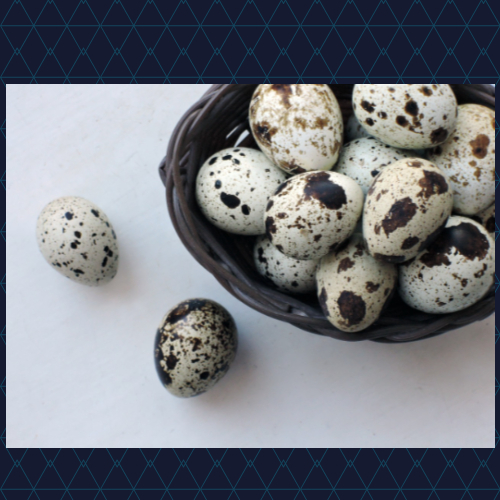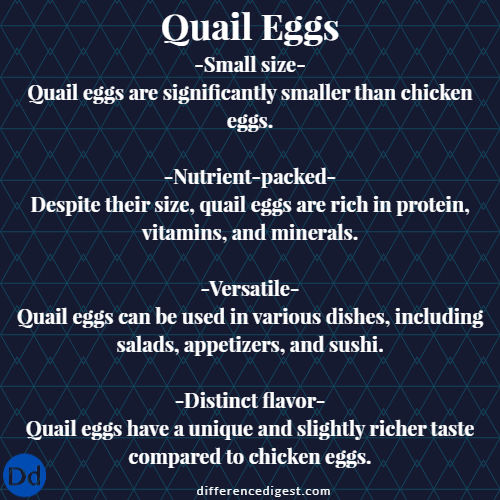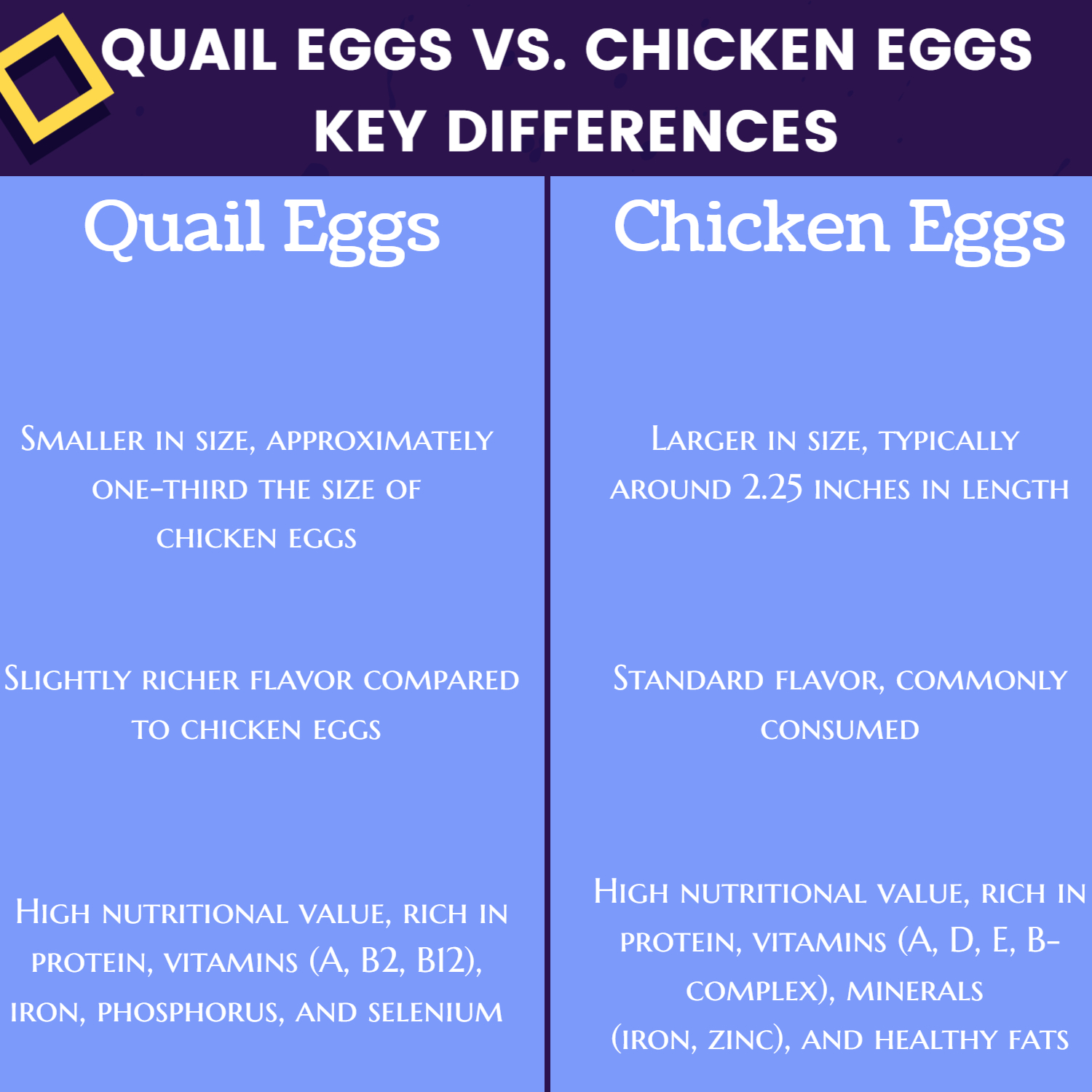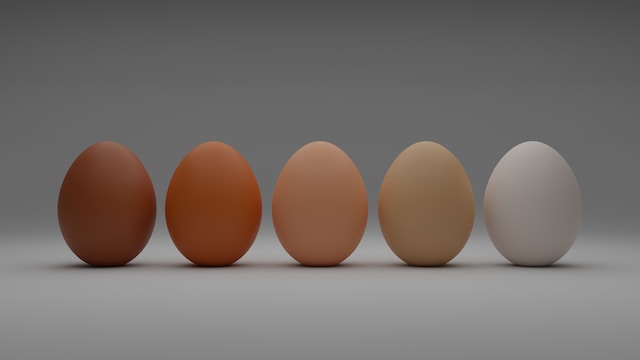Quail eggs are smaller in size with a higher yolk to white ratio and have a richer taste than chicken eggs. On the other hand, chicken eggs are larger and have a milder flavor.
The anatomy of a quail egg


Quail eggs may be small, but they are mighty in their complexity. Let’s take a closer look at the anatomy of these little wonders.
First off, the shell is thinner and more delicate than that of a chicken egg. This makes them slightly trickier to crack open without breaking the yolk inside.
Speaking of yolk, quail eggs have a higher yolk-to-white ratio than chicken eggs. This gives them a richer flavor and creamier texture when cooked.
The size difference between quail and chicken eggs also affects their overall composition. Quail eggs have less water content per unit weight compared to larger chicken eggs, meaning they can cook faster due to less moisture needing to evaporate during cooking.
The air pocket within each egg is proportionally larger in quail eggs since there is less space for it in such a tiny package!
The anatomy of a chicken egg


When it comes to understanding the difference between quail eggs and chicken eggs, one of the first things to consider is their anatomy. Chicken eggs are composed of several distinct parts that work together to create a unique and versatile food source.
First, there is the shell, which serves as a protective barrier for the egg’s contents. This outer layer is made up mostly of calcium carbonate and provides strength and structure to the egg.
Underneath the shell lies two membranes – an inner membrane that clings tightly to the egg white and a thinner outer membrane that separates from it more easily.
Next, we have what most people think of when they picture an egg – its yolk and white. The yolk contains all of the fat in an egg as well as many vitamins and minerals such as iron, vitamin D, B12 and choline. Meanwhile, egg whites or albumin contain most of protein found in an egg along with some other essential nutrients like potassium.
There is also a small air pocket located on top of each chicken’s embryo called “the germinal disk.” Its size will determine whether or not you have fertile eggs but if you bought them at your local store then they’re unfertilized!
Though chicken eggs have complex anatomical structures that make them both highly nutritious (and delicious!) ingredients in various dishes worldwide.
The difference in appearance
When it comes to appearance, there are some noticeable differences between quail eggs and chicken eggs. Let’s start with the size – quail eggs are smaller than chicken eggs, measuring about an inch in length while chicken eggs can be around 2-3 inches long.
Another difference is the color of the eggshells. Quail eggshells have a speckled appearance with shades of brown and white spots while chicken eggshells vary from white to light brown or even blue-green shades depending on their breed.
Moreover, if you take a closer look at both types of eggs side by side, you’ll notice that quail eggs have more rounded ends compared to chicken ones which tend to be pointier.
But appearances aside, another notable difference between these two types of eggs is their yolk-to-white ratio. Quail yolks are bigger relative to their size than those in chickens’ because they require more nutrients for development during incubation.
When comparing quail and chicken eggs based on appearance alone, one would definitely spot many unique characteristics that set them apart from each other.
The difference in taste
When it comes to the difference in taste between quail eggs and chicken eggs, there are a few things to consider. Quail eggs have a stronger flavor compared to chicken eggs. Some people may describe them as having a slightly gamey or earthy taste.
On the other hand, chicken eggs have a more mild and subtle flavor that most people are familiar with. While some may argue that they lack complexity compared to quail eggs, others appreciate their simplicity.
In terms of texture, both types of egg have a similar creamy consistency when cooked properly. However, due to their smaller size, quail eggs can be easier to overcook which can affect the overall taste and texture.
It’s important to note that personal preference plays a big role in determining which type of egg tastes better. Some people enjoy the bolder flavor profile of quail eggs while others prefer the classic taste of chicken eggs.
Regardless of your preference, both types of egg offer unique flavors and can be used in various dishes depending on your cooking preferences.
Quail eggs Vs. Chicken eggs – Key differences
Quail eggs and chicken eggs may look similar, but there are some key differences that set them apart. One of the most obvious differences is size – quail eggs are smaller than chicken eggs, about one-fifth the size in fact!
Another difference between these two types of eggs is their nutritional value. Quail eggs contain more protein and vitamins such as A, B1, B2 and D compared to chicken eggs. On the other hand, chicken eggs have a higher concentration of Vitamin E.
When it comes to cooking with quail or chicken egg, they can be used interchangeably in many dishes such as salads or omelettes. However, because quail’s egg yolk contains less water than a regular hen’s egg yolk , it tends to cook faster making it perfect for recipes like Scotch Eggs.
Additionally even though both type of egg shells appear fragile at first glance an important detail worth mentioning is that Quails’ shells are much harder in comparison which makes them ideal for pickling or using them as decorative Easter Eggs.
These subtle yet significant differences make each type of egg special in its own way. Whether you choose to enjoy a delicious boiled quail’s egg on toast or indulge in your favorite fluffy scrambled hen’s-egg breakfast sandwich – you can rest assured knowing they both have unique qualities that add value to any meal!


Health benefits of quail eggs and chicken eggs
Both quail eggs and chicken eggs come packed with numerous health benefits that can improve overall wellness. For starters, both types of eggs are excellent sources of protein which is essential for muscle growth and repair. In fact, the protein in quail eggs is said to be more easily digestible than that in chicken eggs.
Quail eggs contain a higher concentration of vitamins and minerals compared to chicken eggs. They are particularly rich in Vitamin B12 which helps keep the nervous system healthy, as well as Vitamin D which promotes strong bones and teeth. Additionally, they have high levels of iron, zinc, potassium and phosphorus – all important minerals necessary for optimal body function.
On the other hand, chicken egg yolks are high in choline – an essential nutrient that supports brain development and function. They also contain lutein and zeaxanthin which promote eye health by reducing the risk of cataracts or age-related macular degeneration.
While both types of eggs offer similar health benefits, it’s worth noting their varying nutritional profiles so you can make informed decisions about your diet. Adding either quail or chicken eggs to your daily meals will provide valuable nutrients required for good health without compromising on taste!
Do chicken and quail eggs taste different?
When it comes to the taste of eggs, some people wonder if there is a difference between chicken and quail eggs. The answer is yes, they do have their own unique taste.
Let’s talk about the yolk. Quail egg yolks are typically larger in proportion to the white than those of chicken eggs. They also tend to be richer and creamier in flavor due to their higher yolk-to-white ratio.
Moving on to the whites, you may notice that quail egg whites can be slightly thicker and more viscous compared to those of chicken eggs. This can make them a bit chewier in texture but still tender when cooked properly.
In terms of overall flavor profile, many say that quail eggs have a slightly stronger “gamey” taste compared to chicken eggs. However, this ultimately depends on personal preference and cooking method.
Whether you prefer the taste of chicken or quail eggs will come down to your individual palate. But trying both types side by side could help you discover which one suits your taste buds best!
Featured Image By – Shubham Dhage on Unsplash









